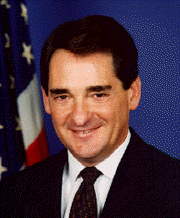Re: House Telecom Subcommittee hearing on HR 1858, a database protection bill.
Date: June 15, 1999.
Source: Office of Rep. Tauzin. This document was created by Tech Law Journal by scanning a fax copy, and converting into HTML.

| Opening Statement by Rep. Billy Tauzin (R-LA). Re: House Telecom Subcommittee hearing on HR 1858, a database protection bill. Date: June 15, 1999. Source: Office of Rep. Tauzin. This document was created by Tech Law Journal by scanning a fax copy, and converting into HTML. |
 |
|
The Honorable W.J. "Billy" Tauzin
Chairman, Subcommittee on Telecommunications, Trade, and Consumer Protection
Opening Statement for Hearing on H.R. 1858
June 15, 1999
The Subcommittee will come to order.
Good morning. The Subcommittee meets today to discuss H.R. 1858 the Consumer and Investor Access to Information Act of 1999, which was introduced by Chairman Bliley, and has received strong bipartisan support from Members of this Committee. Before we begin, Id like to extend a warm welcome to Dr. Gregory O'Brien, Chancellor of the University of New Orleans - it's good to see you, and I look forward to hearing your testimony.
Given the intensified appeal and growth of the Internet, it's no longer clear what information and analysis is proprietary and what is freely available to the public. Last week I read about a case which clearly demonstrates why this hearing is so important for the future of the Internet and electronic commerce.
Amazon.com, the online book retailer, has a page on its website which lists the books on the New York Times best-seller list. For each book on the list, Amazon presents a picture of the cover, the title, the name of the author, the number of pages, the list price, the Amazon price, and a box to click if you want to purchase the book.
Moreover, you can click on another box to link to additional information about. the book, including published reviews, customer reviews a biography of the author, a list of other books by the author offered by Amazon, and links to similar books. In short, Amazon has taken a simple list of the best-selling books and converted it into a wonderful resource for consumers.
The New York Times, however, may not see it that way. The Times apparently believes that Amazon.com is somehow misappropriating its property by identifying the books on the New York Times best seller list, It has sent demand letters to Amazon.com, and Amazon.com has filed a declaratory judgement action.
It is unclear whether the New York Times will prevail on its copyright or trademark theory. However, it is unquestionably clear that the New York Times would prevail if broad database protection legislation was in place.
In my opinion, that would be a troubling result.
Now, it's true that the New York Times best-seller list is widely considered to be one of the most authoritative lists of which books are selling the most in American bookstores. And one must also recognize that the Times invested resources in assembling the list.
But that doesn't alter the reality that the list is still nothing more than a collection of publicly available facts. The list represents the results of a survey, and those results are no less "facts" than the results of any other sampling done by scientists and pollsters every day. And facts belong in the public domain.
Why should someone be civilly -- not to mention criminally -- liable for making use of publicly available facts?
Let me stress that the Times best-seller list is not a list of the books the newspaper's editors believe to be most worth reading. Instead, it purports to be a list of the books the American public, rightly or wrongly, is choosing to buy.
If the Times "owns" the identity of the books on its best seller list, then the NBA "owns" the identity of the players with the highest scoring average, and United Airlines "owns" the information about the published prices of its flights to New Orleans, and NBC "owns" its broadcast schedule.
And if all these well-heeled entities "own" all of this information, then surely they can prevent an Internet company from incorporating it into larger databases of greater value to consumers -- such as Amazon.com's best-seller page, or an electronic TV guide.
Now, let me be clear that I don't think people should have access to trade secret information. People also shouldn't be able to reproduce the copyrighted expression in a database -- the selection and arrangement of the data, as opposed to the data itself.
Further, I don't think that companies should be able to engage in unfair competition with respect to databases. I shouldn't be able to copy a database compiled by Congressman Markey and publish it in substantially the same form and manner that competes with his database.
There may be a narrow gap in the law that currently permits this in certain circumstances, and that gap should be filled. For that reason, I joined my colleagues in cosponsoring Chairman Bliley's legislation.
But we must take care not to over-protect databases. As Alex Kozinski, a judge on the Ninth Circuit, recently wrote:
"Overprotecting intellectual property is as harmful as underprotecting it. Creativity is impossible without a rich public domain. Nothing today, likely nothing since we tamed fire, is genuinely new. Culture, like science and technology, grows by accretion, each new creator building on the works of those who came before. Overprotection stifles the very creative forces it's supposed to nurture."
This is an interesting issue -- as evidenced by our diversified panel. I look forward to hearing from the witnesses whether we have struck the right balance in H.R. 1858.